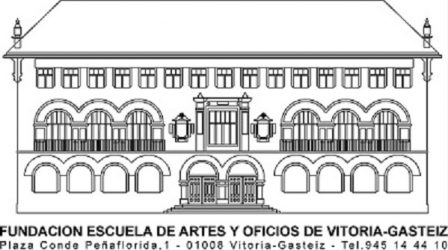Informative summary of the course
(Click here to see the work of our 1st grade students)
(2nd and 3rd grade students) (More works)
The Painting specialty covers four school years of training, PAINTING I, II, III and IV. It does so from a double vision; on the one hand it maintains its more traditional teachings such as drawing and painting in its most diverse techniques; but it also echoes the new realities of the current art scene, promoting interdisciplinary and mixed languages typical of contemporary art.
Days of the week: Monday, Wednesday and Friday
Schedule: from 5:00 pm to 7:00 pm or 7:30 pm to 9:30 pm
Course level: I, II, III and IV
Access conditions: None for the 1st course
Duration: School year from September to June
Painting I
Informative summary of the course
The Painting I course is conceived as a progressive approach from scratch to the world of pictorial creation through color and form. Understanding and creatively applying the basics of drawing, color and volume through the different conventional plastic resources is the basic content of this first course.
METHODOLOGY
Tailored to each level with individualized follow-up.
Classroom work mainly practical with introductions and documented theoretical information.
Progressive introduction of pictorial techniques such as acrylic and oil painting.
CONTENTS
- Initiation to drawing.
- Reaffirmation of the line. Free exercises to have a first contact with the pencil.
- Composition by geometry. Building with lines.
- Learning to see the light. Exercises in charcoal, composite pencil, chalk or sanguine on different supports. Monochrome exercise with inks.
- Color theory. The chromatic circle. Charpentier's cube. Color psychology. Exercises of compositions from cold and warm ranges and complementary colors. First works using only primary colors and white with tempera.
- Still life. First contact with the representation in space. Still lifes with acrylic.
- Learning to look. The viewfinder. Proportions and format. Adaptation to the format and negative gaps. The space of the paper. Compositional axes. Relationship of angles. Exercises with soft pencil and normal paper in DIN A-3 and DIN A-4.
- Perspective and its representation.
- Pictorial language.
- Techniques, supports and basic materials.
- In order to foster a critical awareness of the art world, information is provided on exhibitions and related events.
Painting II
Informative summary of the course
The Painting II course is conceived as a logical continuation of the learning process initiated in the Painting I course. Once the basic fundamentals of drawing, color and volume have been learned through the different conventional plastic resources, a stage of deepening in the field of pictorial creation begins.
METHODOLOGY
Tailored to each level with individualized follow-up.
Classroom work mainly practical with introductions and documented theoretical information.
We completed the oil and acrylic with the pastel technique.
CONTENTS
- Reinforcement of artistic drawing techniques, appreciation of light and use of color through quick exercises.
- Exercises related to reality and the possible ways of representation. From Impressionism to Expressionism. Oil and acrylic. Representation in space.
- Realization of works with pastel technique.
- Elaboration and preparation of the different supports.
- Composition.
- In order to foster a critical awareness of the art world, information is provided on exhibitions and related events.
Painting III
Informative summary of the course
The Painting III course, in continuity with the two previous courses, seeks to obtain the skills, abilities and technical and intellectual resources sufficient to conceive, produce and disseminate satisfactory innovative artistic and cultural products that allow the full enjoyment of the artistic act.
METHODOLOGY
Tailored to each level with individualized follow-up.
Classroom work is fundamentally practical with introductions and documented theoretical information and from there on, at this level, the student's contribution is emphasized.
This course is a deepening in the search for plastic resources through the use of mixed techniques. Textures, collage, dripping, etc...
CONTENTS
- Use of different techniques to reach an end.
- Quick pose sessions conducted by the students themselves.
- The representation of space. Systems of representation and application to the work in still lifes.
- Visual language tools.
- Placement of different fabrics on the frame and preparations.
Painting IV
Informative summary of the course
The Painting IV course closes the training cycle of the Painting specialty and seeks the way to obtain a sufficient degree of maturity to analyze and evaluate one's own work and to be able to develop a solid and consistent creative activity in the pictorial field in the future.
METHODOLOGY
Tailored to each level with individualized follow-up.
Classroom work is fundamentally practical with introductions and documented theoretical information and from there on, at this level, the student's contribution is emphasized.
This course is a deepening in the search for plastic resources through the use of mixed techniques, along with others of a more experimental nature.
CONTENTS
- Knowledge of the nature of the pictorial materials used in the class.
- Advanced concepts of pictorial composition; manipulations, alterations and transgressions of the norm of pictorial space.
- Elements and expressive strategies in the compositional analysis of informalist works.
- Relationship between form and color in contemporary painting.
- Mixed and experimental techniques: glazes, dragging, scraping...
